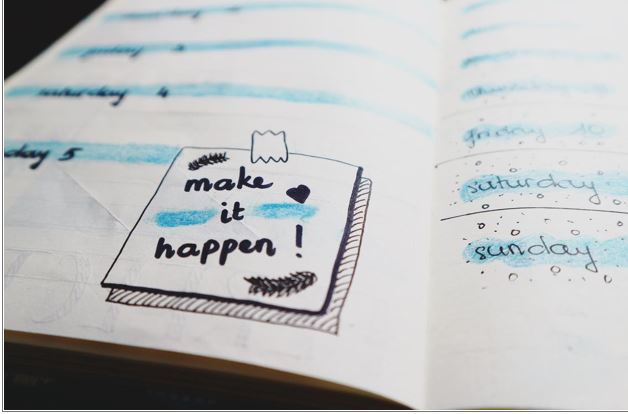How to Stick with Work Plans
One of my biggest struggles in work and my personal life is making plans and sticking to them. It can be difficult managing everything that needs to get done each day, especially when something comes up that forces you to change plans.
For those of you who can create a weekly work plan and stick to them, I envy you. It took me years to figure out how to create plans without panicking last minute because I left it all until the end. That’s why I’m writing this article. I want to help me’s of the world realize that having work plans doesn’t have to be scary and sticking to them is so much easier than letting them fall to the side. Ignoring tasks will only make things worse in the end, especially if you don’t know how long something is going to take you. Here are all the tips and tricks I learned when it comes to sticking to your work plans.
Get a planner

I can’t tell you how amazing it was to buy myself a planner and put in all the dates that were important to me. While many of you might argue that a planner is a waste of time and money when you have your phone’s calendar system, I promise you it’s not.
Putting everything into your phone is difficult because you can only look at your detailed schedule for specific days. You can’t see me for the whole week. It also makes it harder to plan because you’re putting everything in certain timeframes. Well, newsflash, events happen. Maybe you planned to send that important email out at 9 am that morning but your boss called an emergency meeting. Now you feel pressured because of this change. In a planner, you can simply write down all the stuff you have to do that day and anything that is a timed event, like meetings or travel. This gives you an idea of when you won’t be available so you can plan around these big events. Also writing everything down in pen helps your brain remember everything much easier than you would be typing it out. For the best planning practices on how to use a planner, follow the link. https://www.treehugger.com/steps-using-paper-planner-effectively-4858764
Set deadlines
Deadlines are a huge thing to set and stay on top of. It helps you break your work up into parts and prevent things from becoming too much because you’ve pushed it off until the end. Now, making deadlines can be tricky for a lot of people. People think that you have to set deadlines that are super-specific and strict. I actually recommend the opposite. As I mentioned, stuff happens and if you make your deadlines too ridged, it can make it difficult to complete when something unexpected does happen. That’s why I recommend making deadlines that are flexible. Instead of saying I need this particular task done at 11 am, try to make a deadline that’s the end of the day. For example, let’s say you have to finish formatting a document, finish going over the budget review, and put together a new business proposal by the end of the week. Break up the tasks into smaller tasks and spread them out over the week. Then, complete each of those tasks by the end of their assigned day so you’re not letting work build over time.
Hold yourself accountable
Make sure you hold yourself accountable. It’s easy to say you’ll do it tomorrow over and over again until it’s been a week, and you’re no closer to completing your task. Get yourself a coworker who you trust that can make sure you’re staying up to date on your tasks. Let them nag you or give you pushback when you try to blow off your work plan.
Most times, they won’t even need to tell you to do something on your list because you’ll be so busy trying to make sure they don’t have to come to nag you. No one wants to feel like a failure when they have someone monitoring their progress so it’s a good motivational tool to use.
Don’t over-promise or commit

I can safely say I have done this at least a dozen times. While I always manage to get the jobs, I promised done on time, it’s not without a struggle and lots of stress. When you promise or overcommit to things you don’t have room to complete, you’re going to wear yourself down. Burnout in the workplace is real and it hits you like a truck. Don’t let it happen to you by taking on more than you should. Learn when to say no and take time for yourself. Saying yes when you’re becoming exhausted won’t help your situation. It’ll make you physically and emotionally suffer. For more information on the effects of workplace burnout, click here.
Make a daily To-Do List

To-do lists are a great way for you to stay on track with your tasks each day and it lets you do them at your own pace. You’ll be holding yourself to a deadline without it being overly strict or structured. It’s also really satisfying to check or cross off each item on your list. It promotes a sense of accomplishment and keeps you motivated to do more!
Treat yourself when you stay on track
Make sure you reward yourself every time you reach your goals. Maybe that’s with a special treat from your local bakery or supermarket or maybe it’s a much-needed break and a chance to relax. I recommend planning your rewards out in advance so you’ll feel more motivated to complete the task. Knowing what your reward is going to be before you receive it can be just the boost you need to complete them. And you can even give yourself small little rewards that build up to a larger reward at the end of a project. The smaller rewards can be for each small, menial task completed and the large reward can be for the finished project! Keep planning fun!
